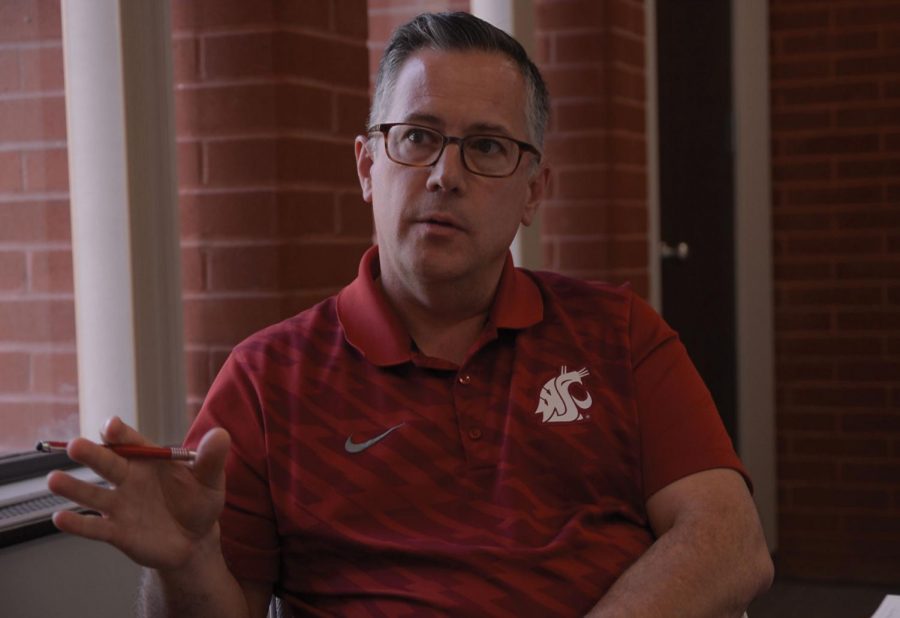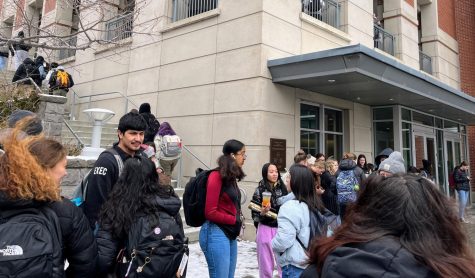WSU rolls out spring COVID-19 testing plan
Strategy has four stages; students living in residence halls will do mandatory arrival tests
RYAN PUGH | DAILY EVERGREEN FILE
WSU will test wastewater samples from residence halls. In dorms that show high levels of viral activity from the samples, residents will be required to get tested for COVID-19, said Phil Weiler, WSU vice president for marketing and communications.
November 11, 2020
WSU will use a four-part testing strategy to test students living in residence halls and employees working on campus for COVID-19 in the spring.
The first step in the plan is mandatory arrival testing, said Phil Weiler, WSU vice president for marketing and communications. Students who arrive on campus in January will be tested for COVID-19 when they check in to their residence halls. They will then be told to isolate themselves in their rooms until they receive their results.
Students who test negative upon arrival can go about their business on campus. Those who test positive will be relocated to a residence hall designated for quarantine and isolation, Weiler said.
Students who live off campus will not be required to be tested but have the option to complete arrival testing when they return to Pullman in the spring, he said.
The next step is ongoing screening testing. This means each student living in residence halls will have to be tested at least two more times in the semester after their arrival test, Weiler said. The number of screening tests may increase depending on what the viral activity looks like in the spring.
Targeted testing is the third step in the plan, Weiler said. WSU will collect wastewater samples from each of the residence halls and test them for viral particles at WSU’s One Health Diagnostics and Incyte Diagnostics Labs. Increased viral levels in the samples could be an early indicator of where infected individuals are living.
In residence halls that show high levels of viral activity from the samples, residents will undergo testing and self-isolate until they receive test results to identify COVID-positive residents, Weiler said.
WSU is working with community leaders and landlords to test wastewater at off-campus living facilities, including Greek housing, he said.
The fourth step in WSU’s plan is diagnostic testing, Weiler said. Any individual experiencing symptoms of COVID-19 will get tested and be quarantined if they are positive.
Diagnostic testing is part of WSU’s current plan for students living in Pullman, he said.
There are about 700-800 students living in residence halls this semester, Weiler said. The university expects to offer housing for about 2,000 more students in the spring, which would keep residence halls below 50 percent capacity. Rooms would remain at single occupancy.
Weiler said students are more successful academically if they live on campus and there have been few, if any, positive cases in residence halls, so WSU plans to offer more housing for students.



















Mark Hilgert • Nov 20, 2020 at 10:53 am
11/19/2020
Jason Sampson, assistant director of environmental health and safety, said the number of positive COVID-19 cases per week from WSU testing has decreased from 350 at its highest to 30 to 40.
Mark Hilgert • Nov 12, 2020 at 9:58 pm
According to Whitman County Public Health, 15 outbreaks in the county have been reported to the Washington State Department of Health. There have been 127 cases linked to Washington State University Greek Housing, 37 cases linked to WSU dorms, 94 cases linked to nine long-term care facilities, eight cases linked to two schools and five cases at two other facilities.
Whitman County has been struggling with COVID-19 outbreaks since August when students began returning to Washington State University in Pullman.
The county had very low rates of coronavirus until late August when some students began returning to campus. WSU instruction is currently all online.